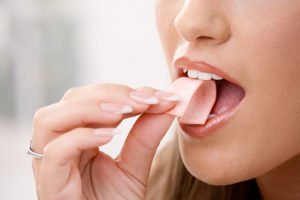Chewing Gum And Your Dental Hygiene
 Over the years, there has been much debate surrounding chewing gum and its impact on dental hygiene. The results can dramatically impact the dental hygiene of many Americans, as the U.S. Census Bureau indicates that 1.8 pounds of gum are consumed by the average American each year. Gum chewers can rest easy knowing that chewing gum can be extremely beneficial to their dental hygiene, although there are some limitations in place.
Over the years, there has been much debate surrounding chewing gum and its impact on dental hygiene. The results can dramatically impact the dental hygiene of many Americans, as the U.S. Census Bureau indicates that 1.8 pounds of gum are consumed by the average American each year. Gum chewers can rest easy knowing that chewing gum can be extremely beneficial to their dental hygiene, although there are some limitations in place.
The Benefits Of Chewing Gum
It’s been proven that chewing sugarless gum for 20 minutes after you eat can help fight tooth decay, as chewing gum directly increases saliva production by up to ten-fold. When you eat, the bacteria in your mouth breaks down the food and releases an acidic byproduct. This byproduct can destroy tooth enamel and lead to tooth decay. However, saliva neutralizes and washes way this acidic byproduct. The influx of saliva introduced when chewing gum directly prevents bacteria from attacking your teeth.
Not only does chewing gum prevent tooth decay, but it can also help strengthen your teeth. Not only does saliva carry calcium and phosphate, which helps strengthen tooth enamel, but companies have begun putting Recaldent into their gum. Recaldent can help remineralize and harden tooth enamel, which strengthens your teeth as a result.
Not All Chewing Gum Is Created Equal
Different chewing gum can have different effects on your dental hygiene. Gums that are sugary will impact your teeth just as candy would. If you’re going to chew gum, you should at least be chewing sugar-free gum. Your best bet, however, is to find gum that has a seal of approval from the American Dental Association, certifying that it can protect your teeth.
According to the ADA, a company can earn this seal “by demonstrating that its product meets the requirements for safety and efficacy for sugar-free chewing gum. Efficacy may include one or more specific indications, such as reducing plaque acids, promoting remineralization of tooth enamel, reducing cavities and/or reducing gingivitis. Studies must also show that the gum is safe to oral tissues.”
You should also be on the lookout for gums that contain xylitol, which inhibits the growth of a specific type of oral bacteria known to cause cavities. Xylitol prevents these bacteria from sticking to your tooth, decreasing your risk of cavities. Although sugar-free gum can be sweetened with many different alternatives, such as aspartame and sucralose, the most beneficial sugar-free gums are sweetened with xylitol.
Chew Gum In Moderation
It’s important to remember that chewing gum is not a replacement for proper brushing and flossing. Chewing gum 24/7 will not adequately keep your mouth clean. In fact, it can lead to serious jaw pain and temporomandibular disorder symptoms. If you are experiencing any symptoms associated with these, you should visit your dentist with The Community Dental Group. Our dentists can help you review your dental hygiene habits and provide tips and practices to ensure a clean mouth.